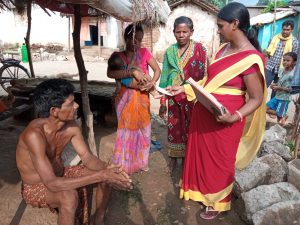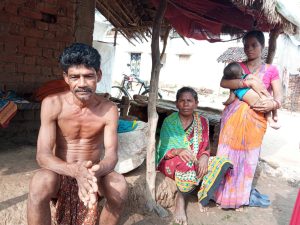Empowering Safer Migration: Western Odisha’s Transformative Initiative
In Odisha, especially Western Odisha, distress migration is driven by economic necessity. According to Govt’s report in 2022, 150,000 migrants registered under the Interstate Migrant Workmen Act, with 70% from Western Odisha working in brick kilns across several states. Around 20-25 thousand children and 50% of women accompany them annually, but the actual numbers are likely higher due to unregistered migrants.
The Migration Challenge
These migrants, often from disadvantaged backgrounds, take loans for survival and face exploitation, hazardous working conditions, and limited healthcare access. Children are particularly vulnerable, as their development is disrupted, and they lack access to education, nutrition, and healthcare. Despite government efforts, child protection remains a major concern in unsafe migration areas.
In an effort to tackle this issue, Aide et Action, an NGO working for the cause of migrants, has collaborated with the Women & Child Development Department, the Government of Odisha, and UNICEF. Together, they have initiated a Migration Management System and a comprehensive set of activities. These initiatives include tracking, pre-departure orientation, and reintegration programmes aimed to empower local communities in regions prone to migration.
Tracking, Pre-departure Orientation, and Reintegration
These interventions have started in migrant-sending districts i.e., Balangir, Bargarh, Kalahandi, Nuapada, and Sambalpur, monitoring the health and education status of migrating families through the Migration Monitoring and Tracking Register. This register, kept at village Anganwadi centers, helps track the health and educational needs of mothers and children, enabling timely interventions.
This Tracking activity of migrants is followed by pre-departure orientation. Pre-departure orientation by Anganwadi workers provides migrants with essential resources and information. They receive a card with important contact numbers, a checklist of required documents, and access to social benefits. This empowers them for safer migration and ensures easy reconnection with social security schemes upon their return.
This season, 271 pre-migration meetings were held across 33-gram panchayats in 3 districts (Balangir, Nuapada, Bargarh), with a total of 6,849 participants. Migration information cards were distributed to 4,289 women and 872 adolescent girls. Padmini Bariha, 28, an Anganwadi worker in Ankamara village, Khaprakhol block, Bolangir district, who is solely involved in this process says, “At the Anganwadi Center, we keep the details of each migrant family and maintained resister. we also strive to empower migrants with knowledge, ensuring their migration is safe and respectful. I’m proud to be a part of this mission.”
Padmini Bariha, 28, an Anganwadi worker in Ankamara village, Khaprakhol block, Bolangir district, who is solely involved in this process says, “At the Anganwadi Center, we keep the details of each migrant family and maintained resister. we also strive to empower migrants with knowledge, ensuring their migration is safe and respectful. I’m proud to be a part of this mission.”
“Our role never ends here we also reintegrate them with the social security schemes when they back to their villages,” she added.
Strengthening Systems To protect children
These interventions are strategically designed to strengthen government systems both in the areas from which migrants originate (source areas) and their destinations, playing a critical role in ensuring the well-being of migrant children. In source areas, these measures support families before migration by addressing their healthcare, education, and social needs. In destination areas, they provide essential information, services, and social benefits, facilitating a smooth reintegration process upon return. Overall, these initiatives bridge the gap between source and destination areas, creating a more comprehensive and integrated approach to the well-being of migrant families, with a particular focus on the welfare of their children. By addressing the needs of migrants at every stage of their journey, from pre-departure to return, these initiatives are instrumental in safeguarding the rights and welfare of the most vulnerable members of these families, the children.
Highlighting the importance of child safety and well-being, Manna Biswas, Specialist, Child Protection at UNICEF, states, ‘Ensuring the safety and well-being of every child, regardless of their circumstances, is our paramount duty. In partnership with organizations like Aide et Action and government agencies, UNICEF strives to leave no child behind, especially in districts with high-unsafe migration’.”
As advocates for the welfare of migrant children and their families, Umi Daniel, Director of the Migration & Education Thematic unit at Aide et Action South Asia, also emphasizes their unwavering commitment, “We firmly believe in ensuring safe migration, free from exploitation. While we can’t always prevent migration, we are committed to making it safe and dignified for migrant children and their families”.
“This system is to empower these prospective migrants with knowledge, skills, and resources to make informed decisions as well as safeguard their well-being throughout the migration process”. He added.
Tangible Impact
The impact of this initiative is both immediate and profound. Families that have undergone pre-migration orientation are better prepared for their journeys. The result is not only safer migration but also increased economic stability and opportunities for these communities.
Ketaki Bariha, 23, of Ankamara village in Khaprakhol block of Bolangir district, a mother of two young children, migrates to Telangana every year to work in brick kilns and earn her livelihood. Every time she returned home from the brick kiln with a horrifying experience without having basic amenities at the worksite, leading to her children suffering from malnutrition. But last year, her migration was smooth. “In 2022, when I worked in Telangana with my 6-month-old and 2.5-year-old kids, I brought essential documents like Aadhar card, BPL card, and Mamata card as advised by our Anganwadi worker. Due to these cards, our children received ICDS benefits and vaccinations, all made possible with the support of Anganwadi worker who was constantly tacking us,” said Ketaki.
“In 2022, when I worked in Telangana with my 6-month-old and 2.5-year-old kids, I brought essential documents like Aadhar card, BPL card, and Mamata card as advised by our Anganwadi worker. Due to these cards, our children received ICDS benefits and vaccinations, all made possible with the support of Anganwadi worker who was constantly tacking us,” said Ketaki.
Another migrant Gobind Bariha, 56, shares a similar experience. He was rescued from a Telangana brick kiln in 2022, and initially intended to return in 8 months but was held due to unpaid debt. They faced mistreatment, lacked medical care, and received no support during their daughter-in-law’s childbirth at the work site. With the knowledge and a card from an Anganwadi worker, they plan to migrate again, hoping to avoid past difficulties.
In a region where distress migration has been an entrenched issue, this effort proves to be a beacon of hope, offering a brighter future to those seeking livelihoods away from their hometowns and paving the way for safer and more dignified migration.

Comments are closed.